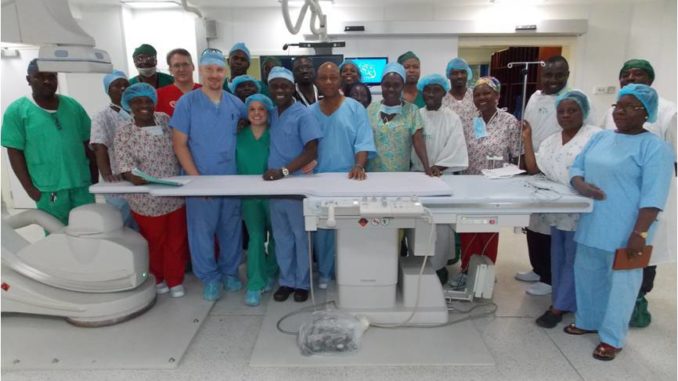
Despite the directive from the National Association of Resident Doctors, NARD, to its members to embark on a total strike, skeletal operations by some doctors were still observed at various health institutions across the country.
PREMIUM TIMES reporters visited some health institutions across the country and noticed minimal activities going on in some of them as patients were seen in the wards with some resident doctors attending to them.
The resident doctors across the country began an indefinite strike to compel the government to honour past agreements hinging on staff welfare, payment of arrears since 2013 and deteriorating health facilities across government hospitals.
Resident doctors are post-graduate doctors on training at secondary and tertiary health institutions in Nigeria especially teaching hospitals and are also under the employment of the federal government during their residency.
When PREMIUM TIMES visited UCH, Ibadan, it was observed that skeletal work was being done by some of the resident doctors as patients were still being admitted with some medical staff going about their clinical duties.
The hospital environment was however calm and quiet, a contrast to how it usually is on a daily basis.
A nurse at the imaging unit who pleaded anonymity said some of the resident doctors have been attending to patients as they “have no choice because their consultants have mandated them to come to the hospital.”
“They cannot join their colleagues in the strike, most of them are been called back by their consultants and they cannot refuse them,” she said.
At the Aminu Kano Teaching Hospital, AKTH, on Tuesday, PREMIUM TIMES observed that activities at the hospital have been crippled by the strike.
The reporter noticed that the ever busy General Out-Patient Department, GOPD was empty due to the industrial action. However, the medical ward and accident and emergency units were offering minimal services.
A 70-year-old patient, Munkaila Shuaibu, said he was discharged on Tuesday after being admitted a few days ago.
“I was admitted on Sallah day. After spending a night at the emergency department, I was transferred to the male medical ward where I spent four days. The doctor said my health condition is stable. That is why he is discharging me,” he said.
Another patient on admission at the male medical ward, Muhammad Ahmad said he is still receiving treatment despite the strike.
“Doctors have come this morning for routine ward round. They have checked those on admission. Nobody told me I will be discharged,” he said.
PREMIUM TIMES also visited the National Hospital and Wuse General Hospital, both in Abuja, where it found some of the resident doctors still working.
Though their activities were skeletal, some of the residents available were seen attending to patients.
Some of the resident doctors on duty who pleaded anonymity said though the strike is on, they are only treating people out of sympathy.
”As you can see, this a large hospital and there are so many patients to attend to. We can’t just leave them stranded. All we are asking is for the federal government to meet our demands. Once this done, all activities go back to normal.
”We are however working undercover now because NARD must not know that some of us are still working. We are not working under the management’s order, it is a self-decision. We are just doing some skeletal work in here,” a resident doctor said.
The Minister of Health, Isaac Adewole had earlier directed the heads of federal government hospitals to ensure that all other doctors in various strata are deployed to fill the vacuum.
This was to ensure that the patients get medical attention and are not turned back as resident doctors are known to attend to the bulk of the patients in government hospitals.
“The few doctors available will attend to those with complicated cases. Those with stable health conditions will be discharged or referred to another hospital.,” he added.
Mr Inuwa said that the consultants will “continue managing the situation, but if the strike goes beyond a week, the patients will be referred to other private hospitals.”
Speaking on the strike in Ibadan on Tuesday, NARD chairman, UCH, Ibadan chapter, Segun Olaopa, said the resident doctors will not be going back to work until the government honours its part of the MoU it had with the association in 2013.
Mr Olaopa said the main concern of the resident doctors was the payment of their salaries and arrears and stoppage of further deductions from their salaries.
“It is very legal for us to go on strike as they cannot be paying us half our salaries since 2014 and expect us not to demand it. The country is currently undergoing harsh economic crisis and it is affecting us too psychologically. How do you expect a psychological imbalanced doctor to treat patients especially in an unconducive environment?
“We have stipulated what we want the government to do for us. Everything is not monetary, so we see no reason why they can’t honour it. They should stop playing jokes and resorting to using the patients and public to blackmail us,” he said.
Mr. Olaopa said the association is willing to meet with the government to discuss a way forward out of the quagmire.
A meeting between the NARD executives and the health and labour ministries has been fixed for Wednesday.
END

Be the first to comment